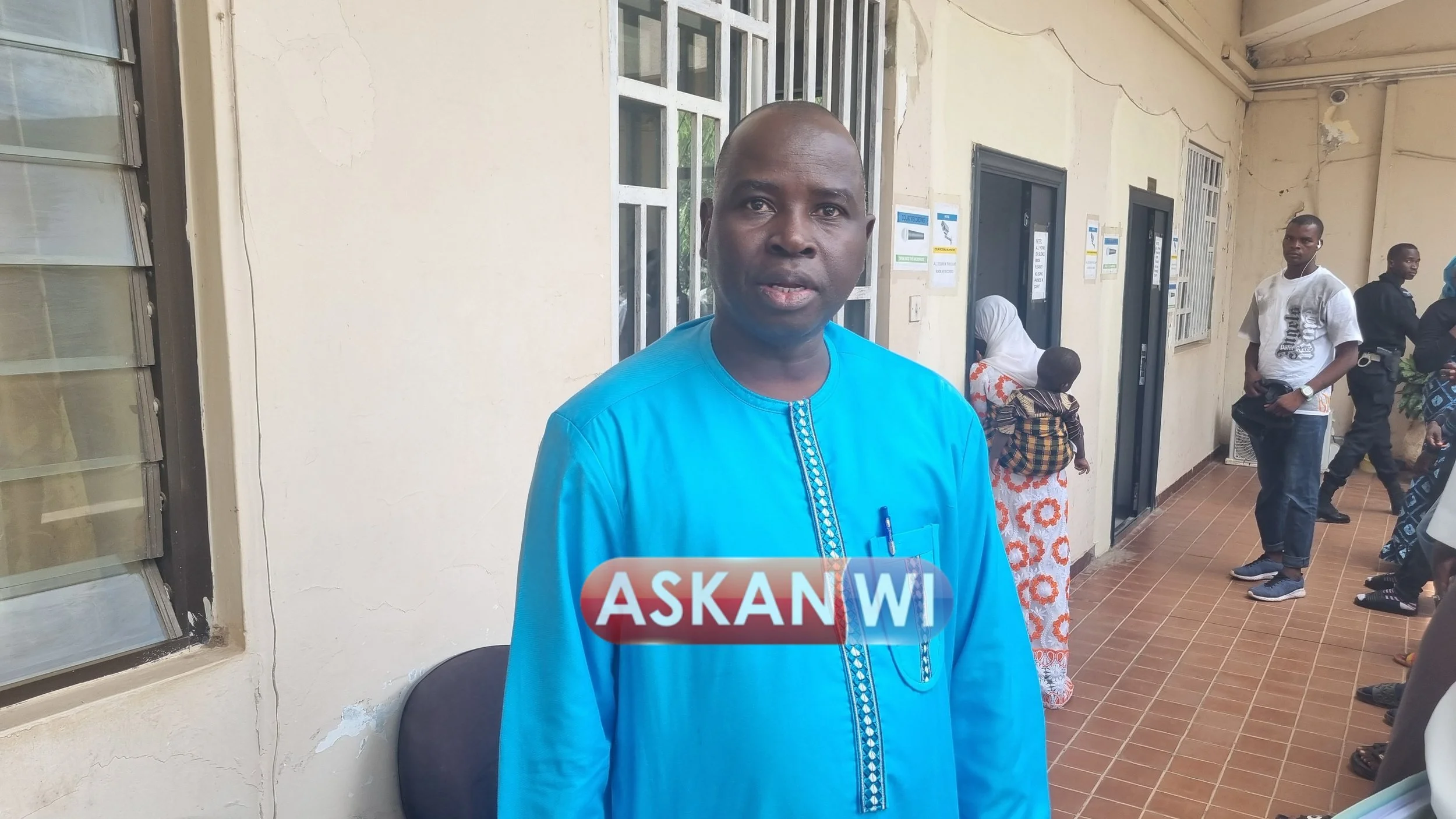Conflicted MCA Director Admits Listing Medicines Without Full Testing Amid Child Deaths
MCA’s Marenah outside court © Askanwi
By Yusef Taylor, @FlexDan
The landmark court case involving the Acute Kidney Injury (AKI) scandal—which claimed the lives of over 70 children in The Gambia—resumed on Thursday, 3rd July 2025. The children died after ingesting contaminated medicines manufactured by Indian company Maiden Pharmaceuticals and imported into the country by Atlantic Pharmaceuticals.
Proceedings began at approximately 11:55 a.m., with the only witness of the day being Mr Essa Marenah, Executive Director of the Medicines Control Agency (MCA). He took over the agency following the dismissal of his predecessors, who were removed in the wake of the President’s investigative inquiry into the tragedy. That investigation concluded that the MCA had failed in its duty to ensure the safety of imported medicines and was riddled with conflicts of interest.
While the previous Executive and Deputy Directors of the MCA were sacked, Regulatory Officer Mr Tijan Jallow—who controversially suggested that rainfall and contaminated water might have been responsible for the deaths—remains in post. Jallow also served as the Supervising Chemist for Atlantic Pharmaceuticals.
Although Mr Marenah now leads the MCA, the inquiry also flagged his own prior conflict of interest due to his long-standing role as Supervising Chemist for Stop Step Pharmacy from 2004 until the release of the report that led to his appointment.
The ongoing civil lawsuit, filed in June 2023 on behalf of 27 bereaved parents, seeks D405 million in damages. It is led by the Gambia Bar Association and Female Lawyers Association, with representation from Farage and Andrews Law Chambers and Counsel Yassin Senghore. The defendants include the Ministry of Health (MoH), the MCA, the Ministry of Justice (MoJ), and the two pharmaceutical companies. Maiden Pharmaceuticals has yet to appear in court, despite being duly served.
During Thursday’s session, Counsel Loubna Farage led a hotly contested cross-examination of Mr Marenah, supported by Counsel Senghore. Farage opened by stressing that the trial centres on the lives of the children who died—a statement that drew objection from Marenah, who attempted to challenge the assertion. Defence Lawyer MD Mballow intervened, arguing that Farage’s statements were prejudicial and sought to shield the witness, but Justice Jaiteh overruled him, reminding Mr Marenah to answer questions directly and refrain from offering unsolicited opinions.
Tensions escalated when Mr Marenah accused Counsel Senghore of insulting him—an allegation dismissed by the court. Justice Jaiteh urged all parties to proceed calmly and focus on the matter at hand.
During questioning, Mr Marenah confirmed that the MCA registers medicines and conducts a separate process known as “Listing”, introduced in 2017 to address the country’s lack of drug testing infrastructure. He explained that while Registration requires testing, Listing does not—but argued that Listing was gazetted and thus legally valid.
Counsel Farage challenged this claim, asserting that Listing was not legally provided for in the MCA Act until after the children’s deaths. She argued that the contaminated drugs in question were Listed, not Registered, and that the agency failed to amend its law to reflect this crucial distinction.
A legal back-and-forth ensued over whether Listing conformed to the MCA Act. Mr Marenah maintained it did but declined to elaborate further, prompting Judge Jaiteh to compel him to respond. When pressed to explain the legal foundation for Listing, Marenah reluctantly agreed to provide a copy of the relevant 2017 regulations.
The cross-examination continued with questions about MCA's registration requirements and the role of experts in approving imported medicines. Marenah argued that multiple experts may be involved, rejecting the notion that one specific expert must oversee communication with importers.
Counsel Farage then suggested that the MCA suspected contamination as early as June 2022. Defence Counsel Mballow objected, claiming she had not substantiated her claim. Again, Justice Jaiteh overruled the objection. Marenah stated that initial theories from doctors at the Edward Francis Small Teaching Hospital (EFSTH) pointed to infections and, later, to paracetamol syrup. He confirmed that public health officials tested floodwater samples at the time.
Farage countered that EFSTH doctors had directly raised concerns about the medications. Marenah acknowledged that a Nigerian expert had warned of drug-related deaths but insisted that tests initially showed the drugs were safe. Later tests identified four syrups from Maiden Pharmaceuticals as contaminated.
Referencing Exhibit D9, Farage presented an MCA letter listing the drugs to be recalled. Marenah initially denied seeing any mention of Maiden but eventually conceded after the relevant section was clearly shown on the screen. Farage then introduced Exhibit D8—lab results from Switzerland confirming the contamination.
When asked whether all the drugs were recalled, Marenah affirmed they were removed by early 2023. However, he later contradicted himself by stating that the recall was still ongoing. Justice Jaiteh clarified that even if medicines were taken out of the country, this couldn’t be deemed smuggling—an interpretation Marenah accepted. Mballow’s attempt to challenge this interpretation was brushed aside as the proceedings continued.
Farage argued that doctors were still prescribing contaminated medicines in December 2022 and that one child had died in January 2023. When she briefly misplaced the relevant exhibit, Mballow moved to strike the question. Once again, he was overruled.
Counsel Farage requested a copy of the MCA’s 2022 Annual Report and documents relating to Atlantic Pharmaceuticals’ application to import the medicines. Marenah admitted he only had the final approval document, not the original application.
As the courtroom watched closely, Farage presented Exhibit P29—a child’s death certificate, a prescription, and a photo of the implicated medicine. Sitting next to the grieving father, our reporter observed the emotional toll as Farage pressed on. Marenah, instead of answering directly, offered repeated clarifications. Judge Jaiteh reminded him that cross-examination required direct answers.
A photo of a yellow cough syrup bottle, closely resembling the WHO’s alert on Maiden Pharmaceuticals’ contaminated medicines, was displayed. Marenah resisted acknowledging the similarity but ultimately admitted MCA does approve packaging, including labelling.
The proceedings concluded with the case adjourned to 2nd October 2025 for the continuation of Mr Marenah’s cross-examination.
Bereaved AKI Parents © Askanwi


